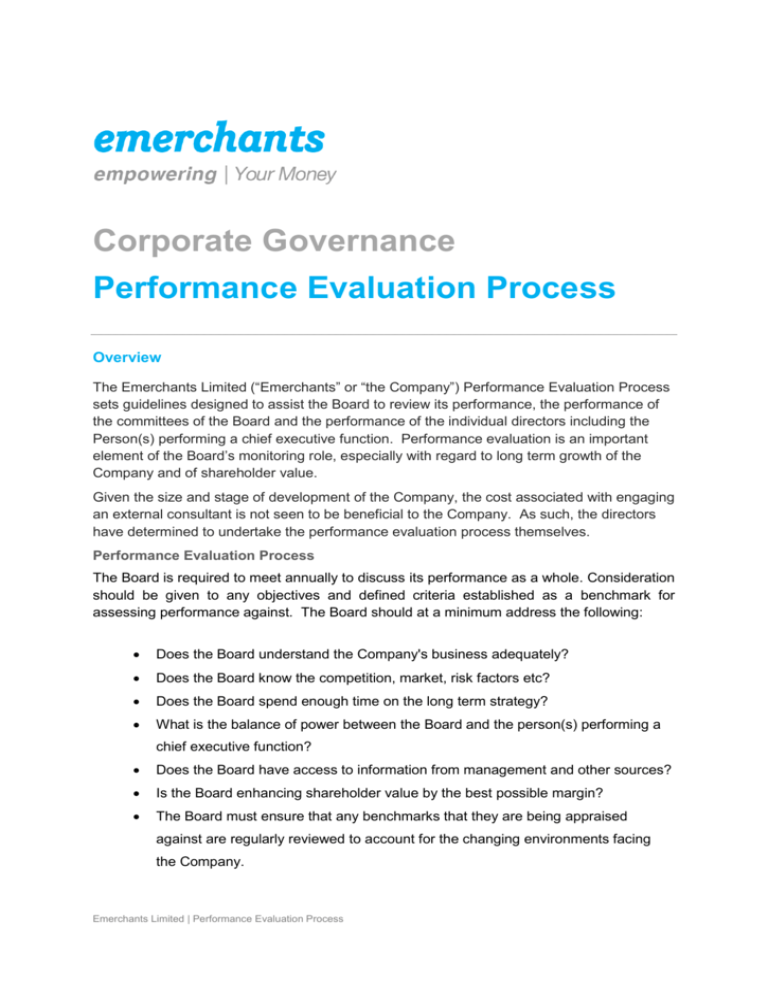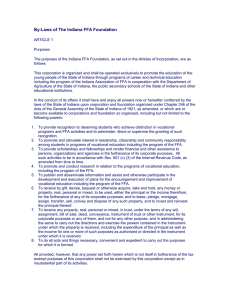Corporate Governance Performance Evaluation Process
advertisement

Corporate Governance Performance Evaluation Process Overview The Emerchants Limited (“Emerchants” or “the Company”) Performance Evaluation Process sets guidelines designed to assist the Board to review its performance, the performance of the committees of the Board and the performance of the individual directors including the Person(s) performing a chief executive function. Performance evaluation is an important element of the Board’s monitoring role, especially with regard to long term growth of the Company and of shareholder value. Given the size and stage of development of the Company, the cost associated with engaging an external consultant is not seen to be beneficial to the Company. As such, the directors have determined to undertake the performance evaluation process themselves. Performance Evaluation Process The Board is required to meet annually to discuss its performance as a whole. Consideration should be given to any objectives and defined criteria established as a benchmark for assessing performance against. The Board should at a minimum address the following: Does the Board understand the Company's business adequately? Does the Board know the competition, market, risk factors etc? Does the Board spend enough time on the long term strategy? What is the balance of power between the Board and the person(s) performing a chief executive function? Does the Board have access to information from management and other sources? Is the Board enhancing shareholder value by the best possible margin? The Board must ensure that any benchmarks that they are being appraised against are regularly reviewed to account for the changing environments facing the Company. Emerchants Limited | Performance Evaluation Process Whilst discussing the performance of the Board, the directors are encouraged to provide comments on the performance of the Chairperson. The Chairperson of the Board is responsible for meeting with the individual directors to discuss their individual performance and contribution to the Board. The Chairperson should at a minimum address the following: Degree of independence including relevance of any conflicts of interests. Familiarity with Company operations and industry trends. Willingness to devote the necessary time including attendance at meetings, extent of preparation for meetings, willingness to participate in committee work. Value and adding value to the contributions of the Board. Level of ethical awareness. Personal relationships with colleagues, management and stakeholders. Whilst meeting with the individual directors to discuss individual performance, the Chairperson must take the opportunity to obtain comments about co-directors’ performance on the Board. As part of the performance evaluation process, all directors are expected where applicable, to highlight areas for improvement and provide a description as to how this can be achieved. At least annually the Board must review the performance of committees reporting to it to ensure that the committees are achieving outcomes. The person(s) performing a chief executive function is responsible for assessing the performance of the key executives and personnel within the organisation. This is to be performed through a formal process involving the completion of a performance appraisal questionnaire which is to be completed by the key executive and reviewed and discussed with the person(s) performing a chief executive function in a formal meeting. The results of any review of the performance of an individual within the Company should be linked to their compensation arrangement. Based on the evaluation of each individual’s performance, the person(s) performing a chief executive function is required to present a recommendation to the Board outlining the proposed compensation arrangements for each individual employee.. In the event that a director, key executive or employee is not performing to an acceptable level, then a performance evaluation can be conducted on an as needs basis. Facilitating Performance by Education Emerchants Limited | Performance Evaluation Process | Page 2 In order to provide directors with the best possible chance of adding value to the Company and contributing to an accepted level, the Company has induction procedures implemented which are designed to allow new board appointees to participate fully and actively in Board decision making at the earliest opportunity. It is noted that new directors cannot be effective until they have a good deal of knowledge about the Company and the industry within which it operates. The Person(s) performing a chief executive function is responsible for ensuring that the new director gains an understanding of all the necessary information relating to the Company. Such items include: The Company's financial, strategic, operational and risk management position. Their rights, duties and responsibilities. The role of the board committees. The orientation and continuing education programs for directors. Access to Information In order to enhance performance, the board is provided with information it needs to efficiently discharge its responsibilities. The following is noted: The Company has an agreed procedure that directors are permitted to take independent professional advice if necessary at the Company's expense. All directors have access to the Company Secretary. The appointment and removal of the Company Secretary is a matter for the decision of the board. Directors are entitled to request additional information where they consider that the information supplied by management is insufficient to support informed decision making. Emerchants Limited | Performance Evaluation Process | Page 3









